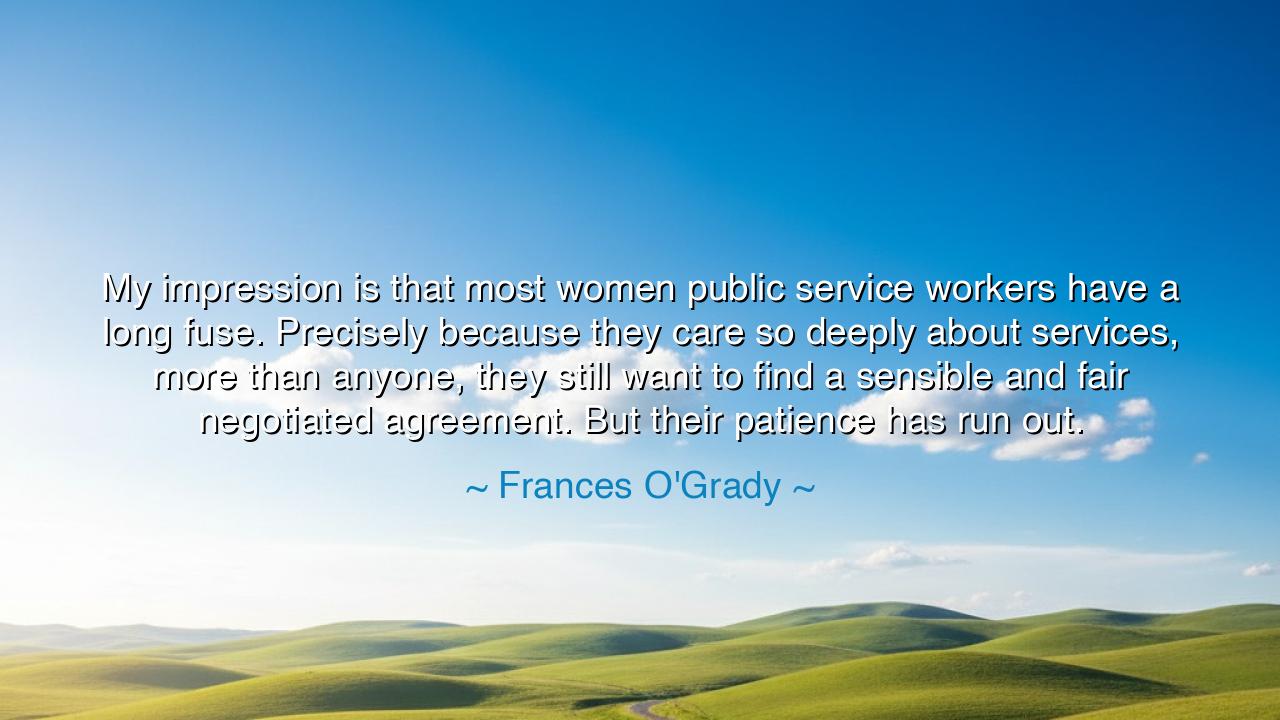
My impression is that most women public service workers have a
My impression is that most women public service workers have a long fuse. Precisely because they care so deeply about services, more than anyone, they still want to find a sensible and fair negotiated agreement. But their patience has run out.






Hear the words of Frances O’Grady, champion of workers and voice of conscience, who declared with clarity: “My impression is that most women public service workers have a long fuse. Precisely because they care so deeply about services, more than anyone, they still want to find a sensible and fair negotiated agreement. But their patience has run out.” In this statement lies the weight of justice, the fire of compassion, and the breaking point of endurance. For though patience is noble, it is not endless, and when the spirit of those who serve is ignored too long, it transforms from quiet suffering into righteous strength.
For she speaks of women public service workers—the nurses who tend the sick, the teachers who guide the young, the social workers who shelter the vulnerable. These women bear the burdens of society with humility and care. Their fuse, long and steady, is born not of weakness but of love, for they labor not for riches but for the wellbeing of others. They endure shortages, indignities, and long hours, believing always in the power of service. But even the most patient soul, when met only with neglect and injustice, must one day rise in defiance.
Consider, O listener, the mill women of Lowell in nineteenth-century America. For years they toiled in the textile factories, breathing dust and spinning thread, yet they bore their hardships quietly, hoping reason would prevail. At last, when their pleas for fair wages and humane hours were ignored, they lit the spark of resistance. With dignity, they left their looms and marched in the streets, declaring that patience had its limit. Their courage sowed the seeds of the labor movement in a land that once thought women too timid to fight.
O’Grady’s words reveal a timeless pattern: those who care deeply are often slow to anger, for they seek harmony, fairness, and peace. They prefer dialogue to conflict, resolution to rupture. Yet it is precisely their deep care that makes their eventual resolve unshakable. When such workers say, “Our patience has run out,” it is no rash cry, but a final truth born of countless sacrifices ignored. Their uprising is not selfish, but protective—protective of the services that sustain all of society.
In these words we also see the strength of women, too often underestimated. Long has history portrayed them as passive, yet from the suffragettes of Britain to the mothers of Argentina’s Plaza de Mayo, women have proven that their endurance, once spent, gives rise to movements that shake nations. The long fuse is not weakness—it is the storing of fire. And when that fire is released, it burns with the power of justice.
What lesson, then, shall we carry? That patience is a virtue, but it must not be mistaken for submission. To leaders and rulers, let O’Grady’s words be a warning: do not exploit the patience of those who serve. Their endurance is a gift, but it has limits. When fairness is denied, when dedication is abused, the breaking of patience will kindle a force far stronger than compliance.
Therefore, O seeker, honor those whose labor sustains your world. If you lead, listen before the fuse burns away. If you serve, know that your patience is noble, but your voice is equally so. When the time comes, speak with courage, act with resolve, and let the world know that patience, though long, is not infinite. For when it is spent, justice demands a new dawn, and the fire of the patient becomes the fire of the powerful.






AAdministratorAdministrator
Welcome, honored guests. Please leave a comment, we will respond soon